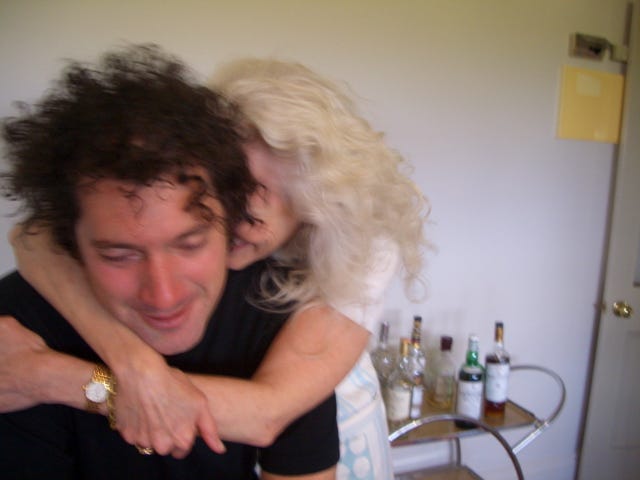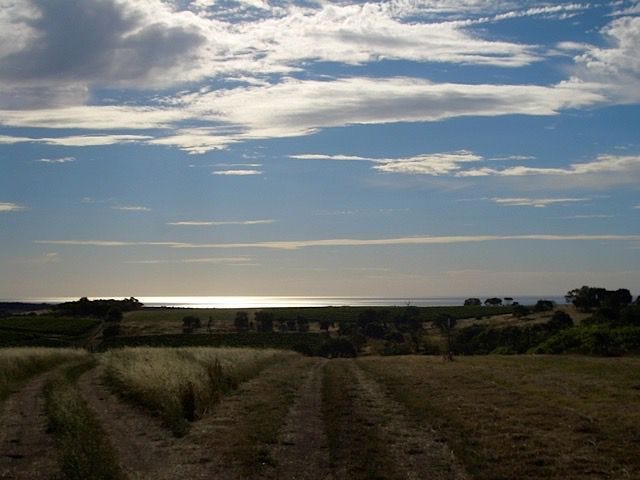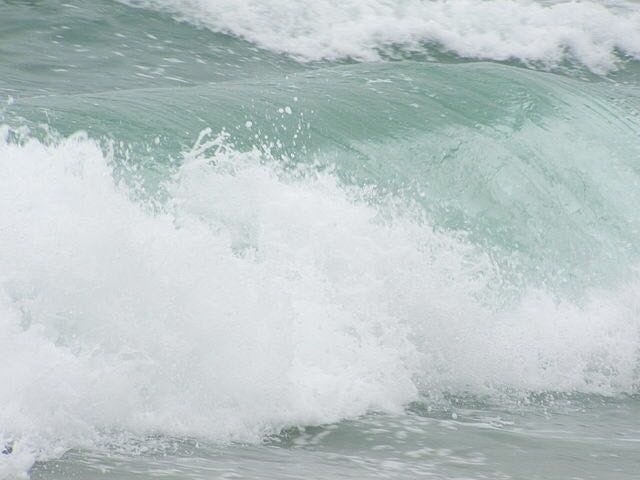Note: Did you come in the middle? Here are links to ➡️ Chapter One, Chapter 2, Chapter 3
OZ
In Missouri, I fantasize: I’m free. I can date. I join JDate, but keep my address as D.C. I can “date” safely? at a distance.
I believe in fairy tales.
The prince and princess in the white house have a Portuguese Water dog. The dog’s name is Bo because Sasha and Malia’s cousins have a cat named Bo and because Mrs. Obama’s father was nicknamed Diddley, as in Bo Diddley, who died June 2, 2008. My sister died on that date in 1993, three years after our mother. I wish for them both.
My family has been broken.
The Obama’s children are beautiful, perfect and happy. They are the dream. But are they real? Or better: Is what we see real? There is a scrim across their lives. There is a scrim across our view of them.
The Grimm brothers told many stories, some of them barely known. “The Frog-Prince” we all know. And don’t we all wish for a time when wishes did some good. Here’s the beginning of “Brother and Sister”:
Little brother took his little sister by the hand and said, “Since our mother died we have had no happiness. Our stepmother beats us every day, and if we come near her she kicks us away with her foot. Our meals are hard bread crusts that are leftover and the little dog under the table is better off, for she often throws it a choice morsel. God pity us. If our mother only knew! Come, we will go forth together into the wide world.”
They walked the whole day over meadows, fields, and stony places. And when it rained the little sister said, “Heaven and our hearts are crying together.”. . . Then the brother said, “Sister, I am thirsty. If I knew of a little brook I would go and get a drink. I think I hear one running.” The brother got up and took the little sister by the hand and they set off to try to find the brook.
My son Ben gave me my wish in December as I was going on semester break from my visiting author’s job at the University of Missouri-Columbia. “Would you like to come to Oz?” he asked.
“Some day, sure,” I answer. I don’t have a signed separation agreement yet. I’m worried about alimony and health care. A vacation? Not possible. I’ve borrowed money from him to pay my attorney.
D., when he learned this, paid Ben back. But the fear revealed by the loan was real even if the fear of D.’s reprisals was not.
Ben bought me a round-trip, business-class ticket to Oz. My son imported and produced serious, ambitious wines from Australia. Before I opened the ticket, he told me not to look at the price. “You are my mother,” he said. I did look: 10,000 bucks. I did not have the funds to fly to Australia coach, let alone, the funds to fly in comfort.
I met on this trip the winemakers he imported. I lived for two weeks on his vineyard: wild and craggy, rough-hewn beauty with a view of the sea.
Here’s what he said when I wasn’t on my computer looking for dates with men in D.C.: “You are strong. Don’t disappoint me. Move on. It’s time. It’s way overtime.”
I’m making dinner at the vineyard one evening and open the refrigerator full of wines I can’t afford. I go outside: It’s summer in Australia in December. I ask which white wine I may choose. “Any that suits you,” he answers.
And later that night when he’s a bit drunk, he howls at me over the fire he’s built in the pit on his veranda.
The evenings are crisp and cool unlike the heat of the summer day. “I’ve seen you ask D. for permission too many times. You are free of him. You are free. Don’t fucking ever ask again for permission to drink a wine in my house. Do you understand me? You are free now. Be strong. Choose, woman!”
In the morning, he asks if he’s been cruel. I reassure that he has not. “Good advice,” I say and we move on—though my heart still breaks for D.

Ben and I part at the airport in Adelaide with tears withheld but visible inside his eyes. I think of the way a lake holds back the sea’s surge as a storm pushes its force from afar. He puts on his shades. I get on the plane.
Ben is not speaking to D. (a great difficulty for me who has two children and they both feel “jerked around,” as Ben put it. And rightly so. Who was I, their mother, to turn to them like the weepy school girl?)
This difficulty, shared by the two, should not be placed in a parentheses but there I place it with this from E. E. Cummings’ poem that begins,
since feeling is first . . .
and that ends:
we are for each other: then
laugh, leaning back in my arms
for life’s not a paragraph
And death i think is no parenthesis
What my son didn’t know is that the return flight was the beginning of my virtual dating and my fantasies about sex. What he didn’t know is that what happened on the flight from San Francisco to D.C. could never have happened if I’d flown coach.
My flight was delayed five hours in San Francisco, so long that the crew changed while most of us stayed on the plane, thinking it would take off soon. It did not. I’d already been traveling some twenty or more hours to get from Adelaide to Sidney and Sidney to San Francisco and to the plane that would take me home. I was jet-lagged and I slept through the five-hour delay. Before I fell asleep, I saw a tall, slim elegant older man, a young seventy was my guess, wearing a blue suede sport jacket—strikingly beautiful and an unusual choice for what looked to me like a forceful man. He walked the aisles and opened his cell phone with purpose—determined I suspected to get another flight.
The CEO.
I sleep and write down this dream when I wake:
I’ve been watching a college baseball game. Men are playing. Ryan, my son-in-law, is hitting and fielding and I’m wondering why he would choose this school when he could’ve gone somewhere so much better (I wake to remember that he played baseball at Dartmouth) but in the dream he attends a no-name school I also attend. I can see the ball coming, know just where it should be struck and have the desire to enter the field, to pick up the bat, to hit it so that the wood cracks with the precision of a well-hit ball, with the sound of wood against leather that is the right-spot sound. The bat does not break.
Then I’m crossing the street, leaving the field and the wind is blowing so hard against me I can see myself as the arc of the letter C trying to cross the street. Someone says, “She may be blown away, she’s light, a feather against it,” but I hold true. I’m wearing a pale taupe coat like the coats Audrey Hepburn wore in Charade. Low heels, pumps like hers. I make it across the street. I make it through the wind. I make it.
How absurd: old woman dreams herself young, like her beautiful daughter who is married to Ryan: my daughter Sarah, the knock-out with brains.
When I woke, I took my quart bag (post 9-11: all liquids must fit in such a bag) and walked toward the restroom to try to repair my face and the CEO met me in the space between the door and the flight attendant station: the galley. I went into the restroom, rattled by the fact that he’d made eye-contact with me. He was standing there when I came out, without my quart bag and it was never to be found. He handed me a slip of paper with his e-mail address and these words, “Looking is an over-rated feminine attribute.” But I had misread the note. I later learned that he’d written “Cooking” instead of “Looking.” He talked to me briefly; I’d been chatting with the woman and her husband behind me; she had been out in the airport and bought some wine she’d shared with him. I had told her something about my book. He and she had talked.
I was too rattled to recall what he said to me in the galley or on the Dulles transport that took us to baggage claim.
When home and after a good long sleep, I wrote him a note with my e-mail address and quoted his line about “looking.”
He replied:
Dear Mary,
Just back a few hours ago from D.C. and still a bit punchy from the flight, accumulated mail, etc.
The napkin your “fellow traveler” gave me had your name and as I recall, a line about your book. My scrawled note was intended to say “Cooking is an over-rated feminine attribute,” meant in jest of course in reaction to The Woman Who Never Cooked. Your themes struck me as a fascinating combination that I’d not ordinarily (perhaps never) associate. Fascinating, to the extent I’d like to know how you connected them. I’ll order a copy tomorrow.
I enjoyed our ultra-brief intersection.
From the opposite coast (Saratoga CA).
And signed with his full name (he’s highly googleable). Here he shall be lower-case d.
And I replied with this babble:
Dear d.,
And, me, after actually some thirty-four hours traveling from Australia, at that point wearing no make-up and carrying around that mass of curly hair that I usually wear more elegantly. Well, here’s what happened to me after you actually spoke to me: I lost my quart bag (that security requirement for lipstick, etc.), because I became flustered—more below on this state of mind. The quart bag had in it my perfume (Opium, by the way) and other quite expensive little bits of female trivia, considered essential by this female to cover the flaws. No steward could then find the little bag. The super pretty one who looked like Nicole Kidman and was quite aware of our bit of intrigue—had an observant eye, apparently—tried her best to help me find it but failed. I was thus unable to do any repair work—so you have seen the bare truth of the matter.
I’m now about to sound like a character out of a Victorian novel here—but what happened is I “swooned” when you met me in the galley—or in today’s vernacular, lost my cool, assuming I ever had any.
Mary
His next subject line is: Can this be???
Dear Mary,
I’ve ordered The Woman Who Never Cooked and look forward to it, wondering the extent to which it was shaped by personal experience, the experiences of others you knew and/or a vivid imagination.
All three? I paint watercolors to exercise the right brain, but I've long felt that “writing” (especially fiction) ranks at the top of creative endeavors.
I confess to no little amazement about our “instant connection” since objectively we’ve interacted in person for exactly 47 seconds. Even with our e-mails it has been ultra-brief. (With glances, etc., it becomes more reasonable wouldn’t you say?) As a writer you must have something to say about the chemistry of spontaneous mutual personal attraction, no?
Your description of your bag of feminine accoutrements provoked smiles and may I remind you that my remark when you said something about not being at your best was along the lines of: “You cannot hide good looks,” something I believe. Naturally it was also intended to put you at ease. Good looks and intellect are a marvelous combination!
In the spirit of full disclosure, I was on my way to spend New Year’s eve with a woman I met on a cruise last year. After what seems like endless months of dealing with loss, I impulsively signed onto a cruise aboard a small ship and made a new friend. I seem to be on an uncertain path, ping-ponging between monasticism and tentative engagement. Best I stop here, lest I tell you more than you’d like.
When I’ve read your book, I’d like to confer, knowing in advance that it will be stimulating, thought-provoking and perhaps a glimpse of MLT beyond that on UAL 782.
d.
And he does read my book, and he does write again.
And once again I swoon:
Dear Sleeping Beauty,
“Sleeping Beauty” is as I first remember you in Seat 7C across two aisles, supine and lovely. The last indelible image is of you turning away with your luggage in tow at Dulles to connect with your driver to take you home in Washington. Your departure seemed abrupt and yet I didn’t know how it could have been otherwise at that stage.
I refuse to say how many times I looked across the aisle, somewhat amazed that you were engaged in animated conversation with the young woman sitting next. (You must have been running on pure adrenalin.). Had you two been in opposite seats you’d have been aware of my glances, so perhaps just as well.
Funny thought as I hiked local hills this afternoon: What do you suppose might have transpired had we been in adjacent seats on 782? My guess is that at some point a cabin attendant might have suggested “more decorum” to put it politely.
d.
It’s three years later and I’ve not met him. We corresponded via e-mail for two of those years and he called me two or three times this past year. At one point, the woman in Washington fell quite ill, a brain tumor and lung cancer. He told me about her trials. I hoped she’d recover. I viewed him loyal and true to her.
I value loyalty as did my son. But unlike my son, I value imperfection.
Virtual dating had begun. My son made it possible. Wishing had begun.
I dreamed of a large wave that rises in the sea.
I see it coming, don’t know what to do but hold an inside rail along the wall of the boat. The wave rides large and full and I float with it, my head barely above it, still holding on. And it does not break. It rides over the entire boat and, in the dream, out to sea, though this is not possible as we are at harbor. If this were not a dream, the wave would have hit the shore, but it did not. The sea was before and behind us. Behind me.
That was the wish.
Here are the worries: I worry about what I did to my children who went through a hard time after D. “needed to be alone” and all the wreckage that came with that decision. They both heard things from a mother that even grown children, both over thirty, should not have heard: I spoke hard and sad about D. I did not know what I was doing. I worried them. I was weak and broken. I was romantic, silly, and searching.
I worry about two strikes—Yes, this is my second marriage that has broken.
I’m learning about repair.
But I also know what wishing can do. In the grim Grimm story, the sister knows that if her brother drinks from the spring, he’ll become bewitched.
She saves him from the fate of becoming a tiger who would tear her to pieces and of becoming a wolf who would eat her. She cannot save him from the fate of drinking finally from the brook that will turn him into a young roebuck.
Instead, here is what she does:
Now the sister cried over her poor bewitched brother, and the little roe wept also, sitting sorrowfully near to her.
But at last the girl said, “Be quiet, dear little roe. I will never, never leave you.”
Then she untied her golden garter and put it around the roebuck’s neck, and she plucked rushes and wove them into a soft cord. This she tied to the little animal and led it on, walking deeper and deeper into the forest.
And when they had gone a very long way they came at last to a little house, and the girl looked in, and as it was empty, she thought, “We can stay here and live.” Then she sought for leaves and moss to make a soft bed for the roe, and every morning she went out and gathered roots and berries, and nuts for herself, and brought tender grass for the roe, who ate out of her hand, and was content and played round her. In the evening, when the sister was tired and had said her prayer, she laid her head on the roe’s back: that was her pillow, and she slept softly on it. And if only the brother had had his human form, it would have been a delightful life.
Or, I ask, would it? For do we really know what wish has been fulfilled?
Coming next: Chapter 5 “Let the Rom-Coms Roll” Table of Contents
If you’re here free and would love to be a dear (I know: double entendre) might you help me by subscribing “paid” — so I can continue to post with even more images? OR, at least:
Grateful acknowledgment is made to the following for permission to reprint previously published material in chapter 4.
E. E. Cummings: The lines from: "since feeling is first". Copyright 1926, 1954, © 1991 by the Trustees for the E. E. Cummings Trust. Copyright © 1985 by George James Firmage, from Complete Poems: 1904-1962 by E. E. Cummings, edited by George J. Firmage. Used by permission of Liverwright Publishing Corporation.










Oh my goodness, those correspondences are wonderful! As is the photo of you and your son.
I resonate with so much here—the way heartache softens and blurs, the worry about who we can be with and how we can rely on our adult children.
What a joy to binge this serial, Mary!
"tears withheld but visible inside his eyes. I think of the way a lake holds back the sea’s surge as a storm pushes its force from afar. He puts on his shades. I get on the plane."
this small but so meaningful scene brings tears to my mother-heart too. A reminder of my far away children and many departures.
As an inveterate fairytale reader/lover, I love the fairytale-scenes woven into your story